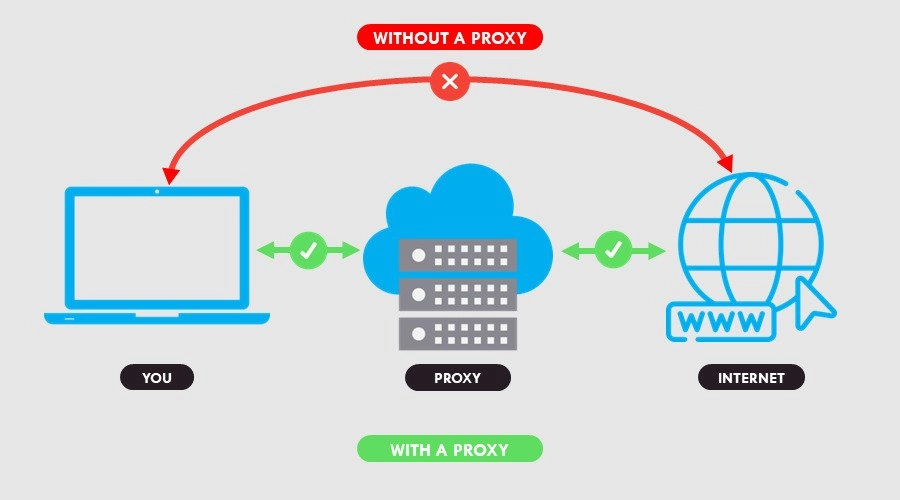In the current digital landscape, proxy servers play a key role in enhancing privacy, safety, and accessibility while traversing the vast ocean of the Web. However, what precisely is a proxy, and how does it function? Essentially, a proxy server acts as an intermediary between your device and the sites you want to visit. By routing your online traffic through another host, it can conceal your IP address and help protect your identity online. This functionality opens up a realm of opportunities for users, from enhancing online safety to overcoming geo-blocking on content.
Nevertheless, the advantages of using proxies extend far beyond mere anonymity. Businesses leverage them to strengthen data protection, while users utilize them to navigate streaming services and online gaming with greater ease. Moreover, the field of data scraping and market analysis has seen proxy servers become invaluable tools for data collection. Understanding the various types of proxies—such as HyperText Transfer Protocol, SOCKS, or residential proxies—along with their unique benefits and drawbacks, can empower users to make educated choices about their online approaches. From non-professional users to enterprise-level organizations, the life of a proxy server is integral to molding our interconnected digital experiences.
Comprehending Proxy Servers
Proxy servers serve as middlemen between clients and the internet. When a client requests a demand to reach a site, the request is first sent to the proxy, which then forwards it to the desired website. The site's feedback goes back to the proxy server before returning to the client. This procedure masks the individual's original Internet Protocol address, enhancing privacy and enabling for the adjustment of demands and replies.
There are various forms of proxies, each having different roles. HTTP servers handle HTTP requests, while SOCKS proxies can process any type of information, making them versatile for various purposes. Open servers, on the other hand, do not alter requests or replies but can be used for saving web content or filtering. Comprehending these differences helps individuals choose the right proxy for their specific needs.
The function of a proxy server extends outside anonymity; it also serves a crucial part in security and performance. By acting as a intermediary, proxies can screen malicious content, block unwanted traffic, and safeguard against internet threats. Additionally, they can boost online speed by storing regularly accessed information. As internet activities continue to increase, the importance of proxies in upholding protection and efficiency cannot be overemphasized.
Benefits and Drawbacks of Using Proxy Servers

Using proxies offers several significant benefits. One of the main advantages is improved online security. By hiding your IP address, proxies help you maintain your anonymity while navigating the web, which is notably useful for protecting personal information from marketers and possible malicious individuals. Additionally, Omeka can help users bypass geo-restrictions, granting access to content that might be not accessible in their location, such as specific streaming services.
However, utilizing proxy servers also comes with specific risks. Not all proxies are safe, and some may monitor your online activity, representing a risk to your privacy instead of protecting it. Free proxy services, in particular, often compromise user security, potentially exposing confidential data to third parties. Furthermore, relying on unreliable proxy servers can lead to lagging internet speeds and instability, negatively impacting your overall browsing experience.
Another significant consideration is the risk for misuse. Go to this website may use proxies for malicious purposes like scraping data from websites without authorization or participating in other unethical online activities. This can not only result in legal troubles but also expose the user to bans and punishments from websites. Therefore, while proxies can be a useful tool for enhancing privacy and security, users must be careful and choose legitimate services to reduce associated risks.
Proxies in Business and Media
In the enterprise world, proxy servers play a vital role in enhancing online security measures. Organizations utilize these proxies to monitor internet traffic, ensuring that staff adhere to web access policies while also protecting confidential data. By routing requests through a secure server, companies can filter out dangerous content and block access to potentially hazardous sites, creating a more secure online environment. This not only helps in mitigating the danger of cyber attacks but also improves overall productivity by reducing distractions.
In the realm of entertainment, proxy servers are instrumental for individuals wanting to access location-restricted content. Video streaming platforms often limit access based on a user's location, but with the use of proxies, people can bypass these restrictions seamlessly. Proxy servers allow users to mask their internet protocol addresses with one from a different region, granting them access to exclusive shows, movies, and live events that may not be available in their location. This capability enhances the viewing experience and opens up a wide library of content that many want.
Moreover, proxy servers can substantially improve the performance of web tasks such as gaming and streaming. They can reduce lag and latency, ensuring a more seamless experience for individuals who rely on instant interactions or quick data transfer. Organizations also benefit from this improved performance, as proxy servers can help in data scraping and market research by managing multiple requests simultaneously without overwhelming the servers they target. This twofold benefit of enhanced performance and security makes proxy servers a valuable tool in both business and leisure settings.
